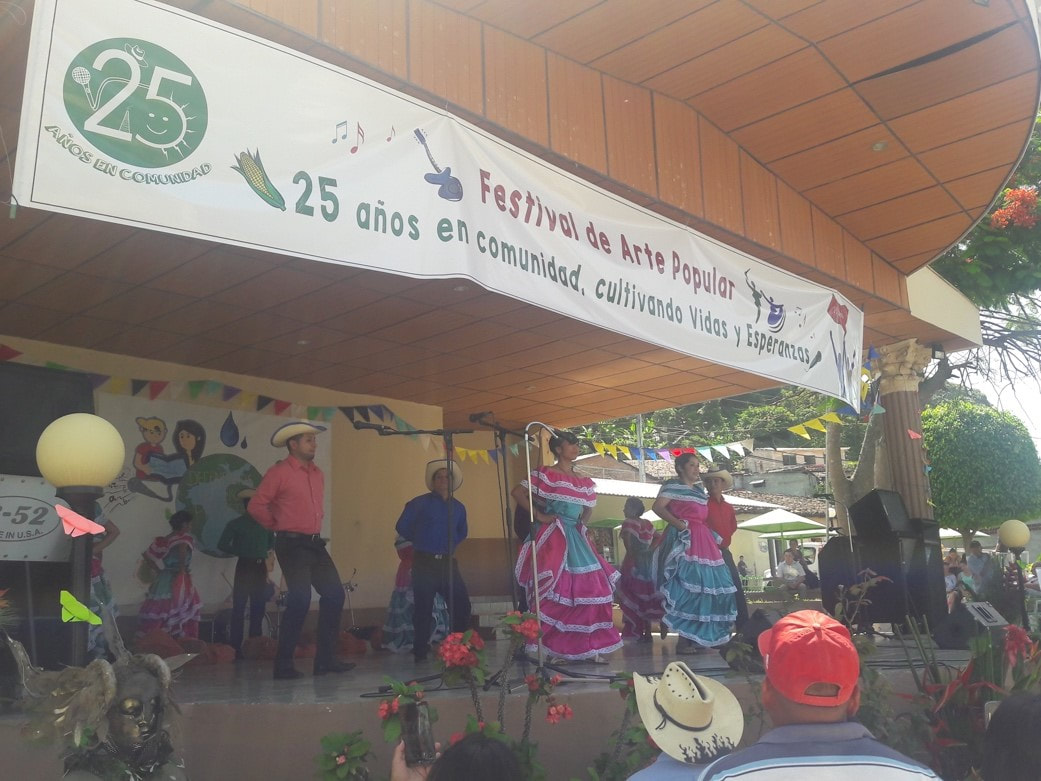From Mining to Water: 25 years of Community Solidarity and Organizing
- Details
- Category: Pacific Rim/OceanaGold
- Published: Friday, 24 August 2018 10:48
The international dimensions of the fight for water in El Salvador
- Details
- Category: Water Crisis El Salvador
- Published: Monday, 02 July 2018 07:27
Local companies tied to foreign capital drive the push to privatize water magament and services in El Salvador.
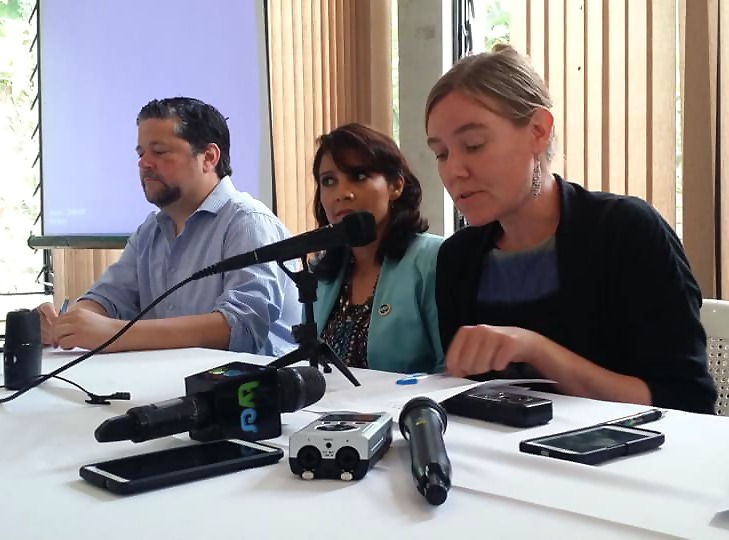
The fight for the defence of water in El Salvador and the recent conflicts that have arisen between legislators and the movement for the defence of water are nothing new in this country.
Since 2006, environmental organizations in El Salvador have demanded the approval of the General Water Law, a bill that recognizes water as a human right and a common good that must be managed publicly with a focus on sustainability, priority and affordability for domestic use, as well as regulation of commercial and industrial use.
Founding statement: National Alliance against Water Privatization in El Salvador
- Details
- Category: Media Releases
- Published: Monday, 25 June 2018 07:41
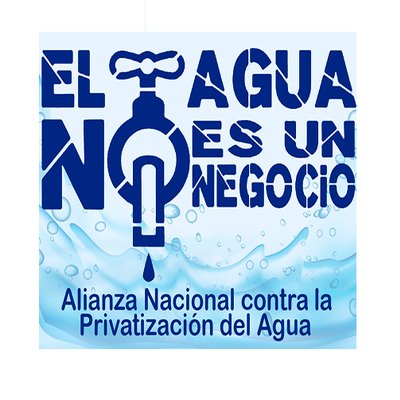
San Salvador June 16, 2018
This morning members of more than seventy social organizations, environmentalists, youth, women groups, churches, unions and universities across the country marched through the main streets of San Salvador to make the public launch of the National Alliance against the Privatization of Water in El Salvador, as a space for coordinating the popular struggle against the threat of commodification of our vital liquid.
We denounce the arrogant water privatization strategy promoted by the oligarchic groups of the country and pushed through the Legislative Assembly by the right wing parties ARENA, PCN, GANA and PDC in coordination with the National Business Association ANEP, through the approval of the so called "Integral Water Law".
The law proposes the creation of a National Water Authority, an autonomous entity that guarantees a majority representation of the business sector in its board of directors through the appointment of two directors from ANEP and its business chambers and two directors from COMURES (a private corporation that brings together municipalities of El Salvador). Both institutions are closely linked with ARENA and add four votes while the executive government can only appoint one. To complement the privatization strategy, a super board of directors is created with absolute powers to control every action, from hiring personnel, managing the water tribunal, controlling local watershed committees, assigning permits, resolving conflicts over the use of water, establishing fees for services, regulating tariffs and other strategic policies of the national water distribution system ANDA.
That is to say, the law proposes the creation of a mechanism that allows the legalization of dispossession (exploitation and contamination) currently carried out by some companies (such as the sugar cane industry) in the interior of the country; in addition to exercising control of ANDA to privatize its most profitable activities.
We are convinced that one of the main oligarchic groups that promotes the "Integral Law of Water" is the sugar industry, (that utilizes 30% of the water consumed throughout the country annually).
The industry finances right wing political parties to continue to avoid paying for exploiting water resources and regulation. A report by the Secretary of Citizen Participation on the financing of political parties indicates that sugar mills, including CASSA, El Angel, La CabaûÝa, Chaparrastique, Jiboa and people linked to the industry as Tomas Regalado DueûÝas and Tomas Regalado O'sullivan, disbursed at least $ 3.2 million in political campaign donations mainly to the ARENA party, which in 2013 alone received $ 1.3 million and $430 thousand in 2017, the same year the PCN and PDC parties received $200 thousand and $80 thousand respectively.
We reject the repression that authorities of the university community were subjected on Thursday June 14th, by the Presidency of the Legislative Assembly, for the simple act of marching against the privatization of water. We also reject the accusations from parties and media outlets at the service of the oligarchy, that we are terrorists, FMLN-linked groups that are launching a smoke screen in the face of government corruption.
We want to clarify that the fight for water began in 2006 with the presentation of the General Water Law proposal by the Water Forum. Since then we have promoted a dialogue a at the legislature for the law to be approved. The dialogue was ended by the right wing parties and the ANEP in June 2017 with the presentation of the "Integral Water Law".
We make an urgent call to social organizations, churches, students and Salvadoran society in general to join in one voice to fight until a General Water Law that guarantees Public Management, community participation, sustainability and the human right to water for the Salvadoran population is approved
Members of the National Alliance against Privatization of Water:
Foro del Agua El Salvador, ASGOJU, AMEYALLI, ASAVIPAZ, ACTIVISTA, ANDES 21 de Junio, Asociaciû°n Juvenil Santaneca, ADES, ARPAS, ARUMES, ASPRODE, ACUA, ADESCOLCO, Asociaciû°n Juvenil pioner@s de El Salvador, BPJ, Centro de Desarrollo Comunal, CDC, CRIPDES, CONFRAS, CONPHAS, CESTA, Comunidades Unidas de Santiago Texacuangos, Caminata Ecolû°gica, Coordinadora Estudiantil, Colectiva Shumul, ECOS El Salvador, Foro Nacional de Salud, FECORACEN, FSS, FSM, Federaciû°n LGBTI, FESPAD, FURD, IMU, KAWOQ, MESUTSO, MOVIAC, Mesa Territorial AhuachapûÀn Sur, MECH, MSM, MOMUJEST, MJDVERDA, Movimiento 5 Mas, MPR-12, Mesoamericanas en Resistencia, MPS, Mesa por la SoberanûÙa Alimentaria, Movimiento Enlaces por la Sustentabilidad, Movimiento por la Defensa de Tacuzcalco, Movimiento de Profesionales de la Salud ã Dr. Salvador Allendeã, Movimiento de artistas y creadores, ORMUSA, PROES, Patronato Lidia Coggiola, PROVIDA, Kolectivo San Jacinto, LAS MELIDAS, RACDES, RAA, Red de Genero de ALAMES, Red de ambientalistas de Santo Tomas, REDES, SITRANDA, SENAMA, SûÙnodo Luterano SalvadoreûÝo, SETA, SITRAUES, SETUES, TUYULU, UNTS, UES, UCA, UJRM, UNES, SITADMES.
Bishops of El Salvador warn against privatizing water
- Details
- Category: Water Crisis El Salvador
- Published: Sunday, 24 June 2018 20:28
 SAN SALVADOR, EL SALVADOR ã El Salvador's bishops urged lawmakers to discard any plans for privatizing water in the Central American country, saying the poor could not afford to pay the cost of a vital necessity.
SAN SALVADOR, EL SALVADOR ã El Salvador's bishops urged lawmakers to discard any plans for privatizing water in the Central American country, saying the poor could not afford to pay the cost of a vital necessity.
In a terse statement, issued June 12 and titled, "We will not allow the poor to die of thirst," the Salvadoran bishops' conference cited Pope Francis' encyclical "Laudato Si', on Care for Our Common Home," which said, "Access to potable and secure water is a basic, fundamental and universal human right because it determines the survival of people and therefore is a condition for the exercising of all other rights."
El Salvador's legislature is starting debate on a national water law. The legislation is proving controversial because some lawmakers favor increased private-sector participation in water management.
The bishops' conference preferred that public oversight of water resources be maintained.
"If a law is approved that grants a private entity the right to decide over distribution of water in the nation, denying the state this function, we would be facing an absolutely undemocratic law, which lacks legitimacy," the bishops said.
"An unjust law that violates the rights of the people cannot be admitted."
The bishops continued: "As pastors, we are witnesses to the outcry of our people, who ask for potable water in all homes and could not pay the costs if (water) is turned into a good, which is subject to market forces."
Water 2.0 - Salvadoreans take to the streets to battle renewed attempts to privatize water resources
- Details
- Category: Water Crisis El Salvador
- Published: Sunday, 24 June 2018 19:12
Barely six weeks have passed since the newly elected, right wing dominated legislature took office, but recent frictions between security personnel of the legislature and university students protesting the potential privatization of water already paint a grim picture of things to come for social movements in El Salvador.
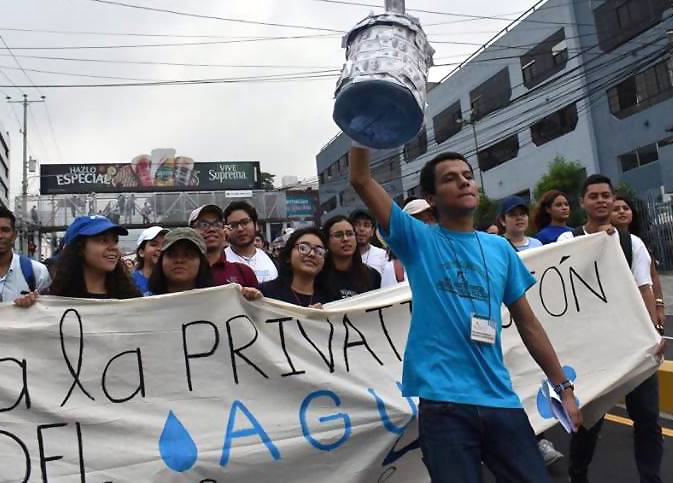 During the month of May, parliamentarians moved to ratify the mining prohibition approved in March 2016 and to shelve all pending requests related to the mining file, at the same time, the Environment and Climate Change Commission, ECCC, moved to reopen a long overdue discussion on water legislation, but hinting to privatization.
During the month of May, parliamentarians moved to ratify the mining prohibition approved in March 2016 and to shelve all pending requests related to the mining file, at the same time, the Environment and Climate Change Commission, ECCC, moved to reopen a long overdue discussion on water legislation, but hinting to privatization.
Since 2006, environmental organizations of El Salvador have pressured lawmakers to approve laws that recognize water as a human right and as a common good that should be publicly managed with focus on sustainability, accessible domestic use and regulation of commercial and industrial use.
El Salvador: first anniversary of the mining ban A cause for celebration, but the new law faces dangers
- Details
- Category: Mining prohibition El Salvador
- Published: Friday, 22 June 2018 11:42
Andrûˋs McKinley - UK LAB
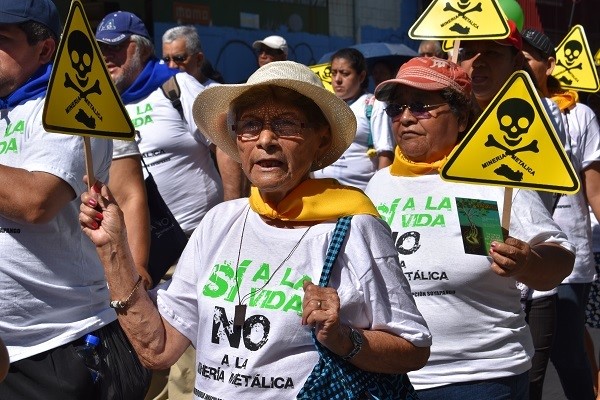 On March 29th, 2017, the small country of El Salvador became the first nation in the world to exercise its sovereign right to say ãnoã to metallic mining after carefully analyzing the costs and benefits of this industry. This historic decision was the result of a persistent 12-year struggle (the length of the civil war in the 80s and early 90s) on the part of threatened communities accompanied by the Catholic Church, environmentalists, academic institutions, broad-based social movements and a variety of other actors.
On March 29th, 2017, the small country of El Salvador became the first nation in the world to exercise its sovereign right to say ãnoã to metallic mining after carefully analyzing the costs and benefits of this industry. This historic decision was the result of a persistent 12-year struggle (the length of the civil war in the 80s and early 90s) on the part of threatened communities accompanied by the Catholic Church, environmentalists, academic institutions, broad-based social movements and a variety of other actors.
Mining in El Salvador. Video by ACISAM
Bills to prohibit metallic mining in El Salvador had been presented in 2006 and 2013, but had been largely ignored by legislators. In 2016, experts on water and mining from the Jesuit-run Central American University, Josûˋ Simeû°n CaûÝas (UCA) teamed up with lawyers from the universityôÇs Department of Juridical Sciences to develop a new proposal. The bill was presented to the Legislative Assembly on February 6 of 2017 by an alliance of the UCA, the Archdiocese of San Salvador and Caritas. On March 9th of that same year, Church and university authorities, accompanied by over 6000 priests, nuns and lay activists concerned with the devastating impact that mining would have on El SalvadorôÇs scarce freshwater resources, took to the streets and marched to the to the Legislative Assembly in support of the bill; and policy decision-makers looked up and listened.
<<<The March Against Metal Mining, San Salvador, 9 March 2017
The dimension of this victory can only be appreciated by recalling the enormous challenges facing anti-mining activists in the early years of the struggle. By 2002, right wing pro-business governments had approved 29 permits to explore for gold and silver in the strategic watershed of the Lempa River, El SalvadorôÇs most important source of freshwater providing 50% of the countryôÇs potable water, 50% of hydro electrical power and irrigation for agriculture in over half of the country. The government in power at the time prioritized foreign investment in its economic growth strategies and was on the threshold of opening the country, without reserve, to transnational mining corporations.
Rural communities threatened by metallic mining had little knowledge of the potential impact of this industry on El SalvadorôÇs vulnerable environment, which has the highest levels of deforestation in Latin America (FAO); the lowest availability of freshwater per capita in Central America (CEPAL); over 90% of its surface waters contaminated by pesticides, untreated sewage and toxic industrial waste (Ministry of Environment and Natural Resources); and is on the verge of water stress (Global Water Partnership). Adding to these challenges, mining companies from Canada and the United States were campaigning aggressively to persuade public opinion, communities and legislators of the benefits of metallic mining with unfounded promises of employment, economic ãboomã and new environmentally friendly technologies they referred to as ãGreen Miningã.
It took over a decade of organizing and educating at local and national levels; lobbying of government and legislators; informing public opinion through communication and media work; building of strategic alliances at the national and international levels and the persistent mobilization of affected communities to finally build a sufficient level of consensus and political will on the part of legislators to approve unanimously the prohibition of metallic mining in the country.
MinerûÙa Verdeãs Facebook SiteMinerûÙa Verde confirms it met with Carlos Calleja
The mining industry has not given up on El Salvador, however. OceanaGold (formerly Pacific Rim), which lost its legal suit for $250 million against El Salvador in 2016, remains in the country through its El Dorado Foundation, hoping to win hearts and minds through philanthropic gestures. A new campaign in support of ãGreen Miningã is now circulating from an unidentified source in Facebook, and presidential hopeful of the powerful Arena party in the 2019 elections, Carlos Calleja, has received important backing from transnational mining interests. Finally, small-scale artisanal miners in the department of la Uniû°n, given ã as part of the mining ban ã a two-year grace period to continue mining activities while searching for alternative economic options, are mobilizing in attempts to reform the current law to allow artisanal mining on a permanent basis.
The UCA and the Catholic Church continue to work with communities and broad-based coalitions in defense of the ban on mining, and water continues to be at the center of our struggle. A 2016 study by the Human Rights OmbudspersonôÇs Office in El Salvador concluded that the country has a life expectancy of approximately 80 years if it does not improve its management of water. Currently, the country lacks adequate legislation and the institutional structures to assure effective, equitable and sustainable access to this strategic resource. In August of 2017, the UCA and the Catholic Church presented to the Legislative Assembly a new proposal for water governance with citizen participation. The proposal is currently being debated in the AssemblyôÇs Commission on Environment and Climate Change.
The victory against metallic mining in El Salvador has generated a more favorable atmosphere for advancing our policy agenda on water governance. It helped sensitize policy decision-makers and the citizenry as a whole on the importance of the environment, now perceived by most as a life or death issue for El Salvador. It raised the level of awareness of water as a public good and a basic human right, essential for all forms of life in an increasingly thirsty world. Finally, it empowered threatened communities, inspired hope and demonstrated that, even in highly polarized nations like El Salvador, people can come together and build consensus on strategic issues, such as the environment, when the common good is prioritized.
Andrûˋs McKinley is a specialist on water and mining at the Jesuit-run Central American University, Josûˋ Simeû°n CaûÝas (UCA), in San Salvador. He was born in the United States, but has lived in Central America for the past 40 years, working on issues of social justice, human rights and sustainable development.
Republished from: https://lab.org.uk/el-salvador-first-anniversary-of-the-mining-ban/
More Articles ...
- Solidarity Statement to the People of El Salvador on the day of OceanGold's AGM
- It is urgent to permanently close the dark chapter of metallic mining in El Salvador
- ãLatin American Countries exposed to law suits from transnational comporations: Manuel Pûˋrez Rocha
- Central Americans Demand to be Consulted About Mining Projects
- Church in El Salvador backs law declaring clean, affordable water as a human right
- Duterte's new warning to mining companies
Subcategories
OceanaGold

